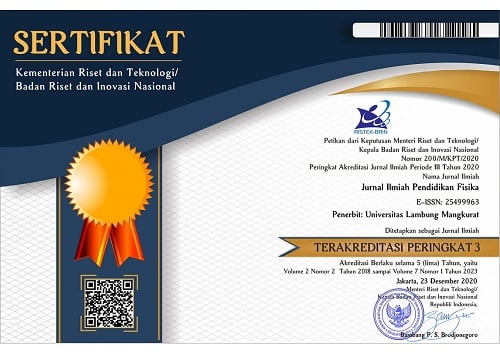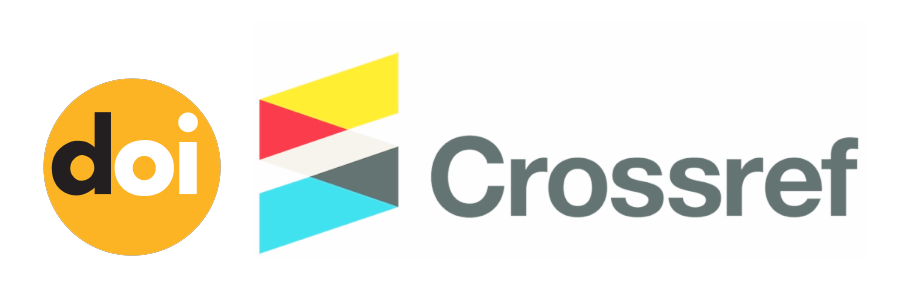Implementation of Formative Assessment in Physics Learning to Improve Students' Conceptual Understanding
Abstract
This research examines the application of formative assessment to physics learning to increase students' conceptual understanding. This literature review includes publications from 2014 to 2024 taken from Google Scholar and GARUDA, with 14 articles taken with appropriate criteria. The research results show that using technology-based formative assessments, such as Google Forms, TikTok videos, multimedia modules, and web-assisted assessment systems, effectively increases students' conceptual understanding and motivation. This approach provides fast and precise feedback, identifies misconceptions, and supports students' scientific argumentation abilities. Overall, applying formative assessment and integrating technology in physics learning is important in deepening students' understanding of concepts.
Keywords
Full Text:
PDFReferences
Akhsan, H., Wiyono, K., Ariska, M., & Melvany, N. E. (2020). Development of HOTS (higher order thinking skills) test instruments for the concept of fluid and harmonic vibrations for high schools. Journal of Physics: Conference Series, 1480(1). https://doi.org/10.1088/1742-6596/1480/1/012071
Aksari, V., Budhi, W., & Hasanah, D. (2021). Pengembangan E-LKPD fisika berbasis inkuiri terbimbing pada materi gerak lurus untuk peserta didik Kelas X SMA. Jurnal Riset Dan Kajian Pendidikan Fisika, 8(1), 43. https://doi.org/10.12928/jrkpf.v8i1.20210
Amaliah, N. U., & Purwaningsih, E. (2021). Analisis pemahaman konsep, multirepresentasi, dan kosistensi jawaban siswa sma pada konsep hukum iii newton. Jurnal Pendidikan Sains Indonesia, 9(4). https://doi.org/10.24815/jpsi.v9i4.21223
Amiroh, D., Kusairi, S., & Sugiyanto, S. (2020). Pengembangangan sistem penilaian formatif berbantuan web (Electronic assessment tool) untuk menunjang pembelajaran fisika. Briliant: Jurnal Riset Dan Konseptual, 5(3). https://doi.org/10.28926/briliant.v5i3.493
Andersson, C., & Palm, T. (2017). Characteristics of improved formative assessment practice. Education Inquiry, 8(2), 104–122. https://doi.org/10.1080/20004508.2016.1275185
Ariska, M., Akhsan, H., Muslim, M., & Azizah, S. N. (2021). Pemahaman konsep awal mahasiswa pendidikan fisika terhadap materi benda-benda langit dalam perkuliahan astrofisika. Jurnal Ilmiah Pendidikan Fisika, 5(3). https://doi.org/10.20527/jipf.v5i3.3523
Arrafii, M. A., & Sumarni, B. (2018). Teachers’ understanding of formative assessment. Lingua Cultura, 12(1), 45. https://doi.org/10.21512/lc.v12i1.2113
Asamoah, D., Shahrill, M., & Latif, S. N. A. (2022). A Review of formative assessment techniques in higher education during covid-19. In Qualitative Report, 27(2). https://doi.org/10.46743/2160-3715/2022.5145
Azizah, H. N., Efendi, R., & Karim, S. (2020). Efektivitas integrasi asesmen formatif concept checks pada pembelajaran fisika dalam meningkatkan kemampuan kognitif siswa SMA. Jurnal Riset Dan Kajian Pendidikan Fisika, 7(2). https://doi.org/10.12928/jrkpf.v7i2.17284
Bell, B., & Cowie, B. (2001). The characteristics of formative
assessment in science education. Science Education, 85(5). https://doi.org/10.1002/sce.1022
Bulunuz, N., & Bulunuz, M. (2017). Effect of formative assessment-based instruction on high school students’ conceptual understanding of balance and torque. Journal of Inquiry Based Activities (JIBA), 7(1).
Bulunuz, N., Bulunuz, M., & Peker, H. (2014). Effects of formative assessment probes integrated in extracurricular hands-on science: Middle school students’ understanding. Journal of Baltic Science Education, 13(2). https://doi.org/10.33225/jbse/14.13.243
Deke, O., Jewaru, A. A. L., & Kaleka, Y. U. (2022). Engineering design process pada stem melalui authentic pbl dan asesmen formatif : Meninjau desain argumentasi ilmiah siswa terkait termodinamika. Borneo Journal of Science and Mathematics Education, 2(3), 101-124.
Ediyanto, E. (2016). Siklus prapembelajaran model penilaian formatif web-based pada pembelajaran fisika materi suhu dan kalor untuk siswa smk kelas x. Jurnal Pendidikan Fisika Indonesia, 12(2), 126–136.
Elmahdi, I., Al-Hattami, A., & Fawzi, H. (2018). Using technology for formative assessment to improve students’ learning. TOJET: The Turkish Online Journal of Educational Technology, 17(2), 182–188.
Evolusi, D. A. N., Dalam, B., & Astrofisika, P. (2012). Konsepsi awal mahasiswa fisika terhadap materi bintang dan evolusi bintang dalam perkuliahan astrofisika. Jurnal Pendidikan Fisika Indonesia (Indonesian Journal of Physics Education), 8(1).
Festiyed, F. (2015). Studi pendahuluan pengimplementasian kurikulum2013 dalam mengintegrasikan pendekatan saintifik melalui model inkuiri dan authentic assessment dalam pembelajaran ipa di kota padang. SEMIRATA Universitas Tanjung Pura Pontianak, 2015 Mai,1-12.
Fukuda, S. T., Lander, B. W., & Pope, C. J. (2022). Formative assessment for learning how to learn: Exploring university student learning experiences. RELC Journal, 53(1). https://doi.org/10.1177/0033688220925927
Gaylard Baleni, Z. (2015). Online formative assessment in higher education: Its pros and cons. Electronic Journal of E-Learning, 13(4), 228–236.
Geisinger, K. F. (2016). 21st century skills: What are they and how do we assess them?. Applied measurement in education, 29(4), 245-249.
Haug, B. S., & Mork, S. M. (2021). Taking 21st century skills from vision to classroom: What teachers highlight as supportive professional development in the light of new demands from educational reforms. Teaching and teacher education, 100, 103286.
Hindriyani, A., Kusairi, S., & Yuliati, L. (2020). Kemampuan memecahkan masalah rangkaian arus searah pada pembelajaran berbasis masalah disertai penilaian formatif. Jurnal Pendidikan: Teori, Penelitian, Dan Pengembangan, 5(9), 1237.
https://doi.org/10.17977/jptpp.v5i9.14003
Irma, Z. U. (2022). Efektivitas e-formative assessment untuk meningkatkan penguasaan konsep pada materi fluida statis. Jurnal Pendidikan, 23(2).
Irons, A., & Elkington, S. (2021). Enhancing learning through formative assessment and feedback. In Enhancing Learning through Formative Assessment and Feedback. https://doi.org/10.4324/9781138610514
Kamar, N., Kusairi, S., & Zubaidah, S. (2016). Pengembangan asesmen formatif dan remediasi berbasis komputer pada pokok bahasan suhu dan kalor smp kelas vii. Lensa: Jurnal Kependidikan Fisika, 4(2).
https://doi.org/10.33394/j-lkf.v4i2.93
Kusairi, S. (2012). a Computer-assisted analysis of physics formative assessment for senior high schools. Jurnal Penelitian Dan Evaluasi Pendidikan, 16(3), 68–87.
Kusairi, S., Hardiana, H., Swasono, P., Suryadi, A., & Afrieni, Y. (2021). E- formative assessment integration in collaborative inquiry: a strategy to enhance students’ conceptual understanding in static fluid concepts. Jurnal Pendidikan Fisika Indonesia, 17(1), 13–21.
Lee, H., Chung, H. Q., Zhang, Y., Abedi, J., & Warschauer, M. (2020). The effectiveness and features of formative assessment in us k-12 education: A systematic review. Applied Measurement in Education, 33(2). https://doi.org/10.1080/08957347.2020.1732383
Leenknecht, M., Wijnia, L., Köhlen, M., Fryer, L., Rikers, R., & Loyens, S. (2021). Formative assessment as practice: the role of students’ motivation. Assessment and Evaluation in Higher Education, 46(2). https://doi.org/10.1080/02602938.2020.1765228
Maknun, J. (2020). Implementation of guided inquiry learning model to improve understanding physics concepts and critical thinking skill of vocational high school students. International Education Studies, 13(6),
–130.
Maulidyah, R. L., & Zainuddin, A. (2022). Implementasi tes formatif berbasis multirepresentasi untuk analisis pemahaman konsep siswa. Jurnal Penelitian Pembelajaran Fisika, 13(1). https://doi.org/10.26877/jp2f.v13i1.11317
Mbonyiryivuze, A., Yadav, L. L., & Amadalo, M. M. (2022). Physics students’ conceptual understanding of electricity and magnetism in nine years basic education in Rwanda. European Journal of Educational Research, 11(1). https://doi.org/10.12973/EU-JER.11.1.83
Menéndez, I. Y. C., Napa, M. A. C., Moreira, M. L. M., & Zambrano, G. G. V. (2019). The importance of formative assessment in the learning teaching process. International Journal of Social Sciences and Humanities, 3(2), 238–249. https://doi.org/10.29332/ijssh.v3n2.322
Morris, R., Perry, T., & Wardle, L. (2021). Formative assessment and feedback for learning in higher education: A systematic review. Review of Education, 9(3), 1–26. https://doi.org/10.1002/rev3.3292
Mufit, F., & Fauzan, A. (2023). The effect of cognitive conflict-based learning (CCBL) model on remediation of misconceptions. Journal of Turkish Science Education, 20(1).
Nababan, N. P., Nasution, D., & Jayanti, R. D. (2019). The effect of scientific inquiry learning model and scientific argumentation on the students’ science process skill. Journal of Physics: Conference Series, 1155(1). https://doi.org/10.1088/1742-6596/1155/1/012064
Niasari, M. (2022). Instrumen penilaian formatif berbasis google form pada materi usaha dan energi. Diffraction, 3(1). https://doi.org/10.37058/diffraction.v3i1.2861
Nuha, S. A., Kusairi, S., & Sujito, S. (2017). Pengaruh implementasi formative feedback berbasis web dengan menggunakan butir isomorfik terhadap penguasaan konsep fisika siswa sma pokok bahasan: usaha dan energi. Seminar Nasional Fisika Dan Pembelajarannya, September.
Pellegrino, J. W. (2014). Assessment as a positive influence on 21st century teaching and learning: A systems approach to progress. Psicología Educativa, 20(2), 65-77.
Puspitasari, R., Mufit, F., & Asrizal. (2021). Conditions of learning physics and students’ understanding of the concept of motion during the covid-19 pandemic. Journal of Physics: Conference Series, 1876(1). https://doi.org/10.1088/1742-6596/1876/1/012045
Rahmawati, S., Kusairi, S., & Sutopo. (2019). Analisis penguasaan konsep siswa yang belajar materi momentum dan implus berbasis scientific approach disertai formative assessment berbantuan web. Jurnal Pembelajaran Sains, 3(1).
Rahmita, F. I., & Wasis, W. (2022). Remediasi miskonsepsi dengan lkpd model guided inquiry learning berbantuan phet simulation pada materi fluida dinamis. Jurnal Ilmiah Pendidikan Fisika, 6(2). https://doi.org/10.20527/jipf.v6i2.5276
Ramadhani, D. P. (2021). Analisis penerapan asesmen formatif dalam pembelajaran ipa dan fisika: literature review. LENSA (Lentera Sains): Jurnal Pendidikan IPA.
Rosuli, N., Koto, I., & Rohadi, N. (2019). Pembelajaran remedial terpadu dengan menerapkan model pembelajaran generatif untuk mengubah miskonsepsi siswa terhadap konsep usaha dan energi. Jurnal Kumparan Fisika, 2(3), 185–192. https://doi.org/10.33369/jkf.2.3.185-192
Rosyad, S., Diantoro, M., & Kusairi, S. (2021). Pengaruh scientific approach berbantuan penilaian formatif terhadap motivasi belajar dan hasil belajar fisika siswa kelas xi perempuan pada materi elastisitas. Jurnal Pendidikan: Teori, Penelitian, Dan Pengembangan, 5(10). https://doi.org/10.17977/jptpp.v5i10.14134
Rother, E. T. (2007). Systematic literature review X narrative review. In ACTA Paulista de Enfermagem, 20 (2).
https://doi.org/10.1590/s0103-21002007000200001
Sari, I. P., Mustikasari, V. R., & Pratiwi, N. (2019). Pengintegrasian penilaian formatif dalam pembelajaran IPA berbasis saintifik terhadap pemahaman konsep peserta didik. JIPVA (Jurnal Pendidikan IPA Veteran), 3(1), 52. https://doi.org/10.31331/jipva.v3i1.778
Schildkamp, K., van der Kleij, F. M., Heitink, M. C., Kippers, W. B., & Veldkamp, B. P. (2020). Formative assessment: A systematic review of critical teacher prerequisites for classroom practice. International Journal of Educational Research, 103(April), 101602. https://doi.org/10.1016/j.ijer.2020.101602
Soamole, S., Amiroh, D., & Salim, A. (2024). Pengembangan e-formative assessment pada materi suhu dan kalor untuk meningkatkan hasil belajar fisika dengan balikan video tik tok. SAINTIFIK@: Jurnal Pendidikan MIPA, 8(2). https://doi.org/10.33387/saintifik.v8i2.7349
Sudakova, N. E., Savina, T. N., Masalimova, A. R., Mikhaylovsky, M. N., Karandeeva, L. G., & Zhdanov, S. P. (2022). Online formative assessment in higher education: Bibliometric analysis. in education sciences, 12(3). https://doi.org/10.3390/educsci12030209
Syahputra, E. (2018). Pembelajaran abad 21 dan penerapannya. Prosiding Seminar Nasional SINASTEKMAPAN, I(11), 1276–1283.
Taqwa, M. R. A., Febriyanto, M. A., & Misbakhussuduri, A. (2022). Pengembangan modul elektronik berbasis multimedia dengan asesmen formatif pada materi fluida statis. Jurnal Inovasi Pendidikan Sains Dan Terapan, 1(2).
Van Orman, D. S. J., Gotch, C. M., & Carbonneau, K. J. (2024). Preparing teacher candidates to assess for learning: A systematic review. Review of Educational Research, March. https://doi.org/10.3102/00346543241233015
Winaryati, E. (2018). Penilaian kompetensi siswa abad 21. Seminar Nasional Edusainstek FMIPA UNISMUS 2018, 6(1), 6–19.
Xiao, Y., & Watson, M. (2019). Guidance on conducting a systematic literature review. Journal of Planning Education and Research, 39(1). https://doi.org/10.1177/0739456X17723971
Y. Benben, V., & Allein Antoenette C. Bug-os, M. (2022). Physics students’ academic achievement and motivation in a gamified formative assessment. American Journal of Educational Research, 10(6). https://doi.org/10.12691/education-10-6-2
Yan, Z., & Pastore, S. (2022). Assessing teachers’ strategies in formative assessment: The teacher formative assessment practice scale. Journal of Psychoeducational Assessment, 40(5). https://doi.org/10.1177/07342829221075121
Yin, Y., Tomita, M. K., & Shavelson, R. J. (2014). Using formal embedded formative assessments aligned with a short-term learning progression to promote conceptual change and achievement in science. International Journal of Science Education, 36(4). https://doi.org/10.1080/09500693.2013.787556
Zamista, A. A. (2022). Online assessment as an alternative learning assessment in the digital era: A systematic literature review. INSANIA : Jurnal Pemikiran Alternatif Kependidikan, 27(2).
DOI: https://doi.org/10.20527/jipf.v8i3.12769
Refbacks
- There are currently no refbacks.
Indexed by: Jurnal Ilmiah Pendidikan Fisika is licensed under a creative commons attribution-share alike 4.0 international license
Statistics Counter |
















